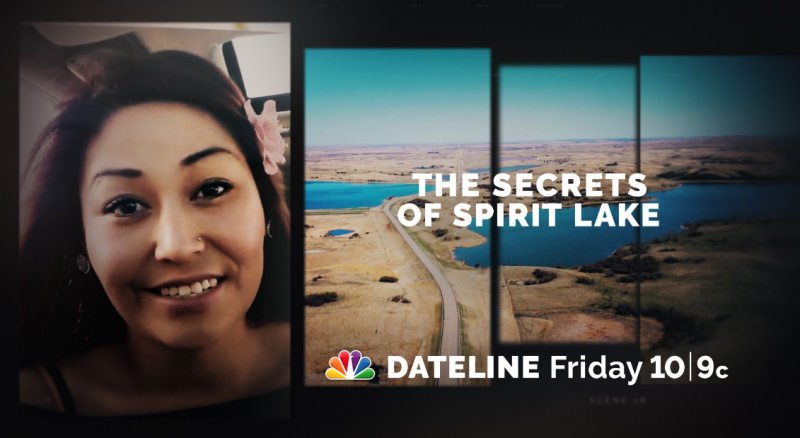
- Details
- By Native News Online Staff
The epidemic of missing and murdered Indigenous women will be examined in a special one-hour Dateline NBC program called The Secrets of Spirit Lake.
NBC News’ Andrea Canning will report on how jurisdictional rules between tribal and non-tribal law enforcement can leave families alone in their search for answers, and on the growing movement demanding change.
Canning interviewed Interior Secretary Deb Haaland (Laguna Pueblo) to provide insight into the epidemic that Indigenous women have encountered for centuries.
“This is a crisis that's been happening in our country since colonization, and it's very, very deep. And so I'm grateful that we're seeing some action on it right now,” Sec. Haaland told Canning.
Click here to watch the exchange.
In addition to Sec. Haaland, Canning speaks with Lissa Yellow Bird (Spirit Lake), an advocate and investigator who helps solve cases, about how Yellow Bird’s search for answers in the disappearance of her niece, Carla Yellow Bird, exposed cracks in law enforcement.
The special, which airs at 10 p.m. (EDT) on Friday, is part of NBC News’ week-long The Vanished series, featuring in-depth and exclusive coverage on missing and murdered Indigenous women. Reports will air across TODAY, NBC Nightly News with Lester Holt, NBC News NOW, NBCNews.com and MSNBC.
The series will include NBC News correspondent Morgan Radford’s report on the difficulties one Indigenous family is facing as they search for their three-year-old child and NBC News correspondent Maura Barrett's interviews with grassroots organizers who are using their voice and social media platforms to push for change. Additionally, NBC News correspondent Antonia Hylton meets survivors of Holy Childhood, located in Harbor Springs, Michigan boarding school accused of abusing Native American children for decades. She examines why these schools are now reckoning with their traumatic legacy.
The Vanished will also feature NBC News reporter Graham Lee Brewer (Cherokee) interviewing Washington Attorney General Bob Ferguson about a new state task force on missing and murdered Indigenous women, exploring how shortfalls in both data collection and resources can hamper this work.
More Stories Like This
Native News Weekly (August 25, 2024): D.C. BriefsUS Presidents in Their Own Words Concerning American Indians
Wounded Knee Massacre Site Protection Bill Passes Congress
Two Murdered on Colville Indian Reservation
NDAA passes House; Lumbee Fairness Act Advances
Help us defend tribal sovereignty.
At Native News Online, our mission is rooted in telling the stories that strengthen sovereignty and uplift Indigenous voices — not just at year’s end, but every single day.
Because of your generosity last year, we were able to keep our reporters on the ground in tribal communities, at national gatherings and in the halls of Congress — covering the issues that matter most to Indian Country: sovereignty, culture, education, health and economic opportunity.
That support sustained us through a tough year in 2025. Now, as we look to the year ahead, we need your help right now to ensure warrior journalism remains strong — reporting that defends tribal sovereignty, amplifies Native truth, and holds power accountable.
 The stakes couldn't be higher. Your support keeps Native voices heard, Native stories told and Native sovereignty defended.
The stakes couldn't be higher. Your support keeps Native voices heard, Native stories told and Native sovereignty defended.
Stand with Warrior Journalism today.
Levi Rickert (Potawatomi), Editor & Publisher

